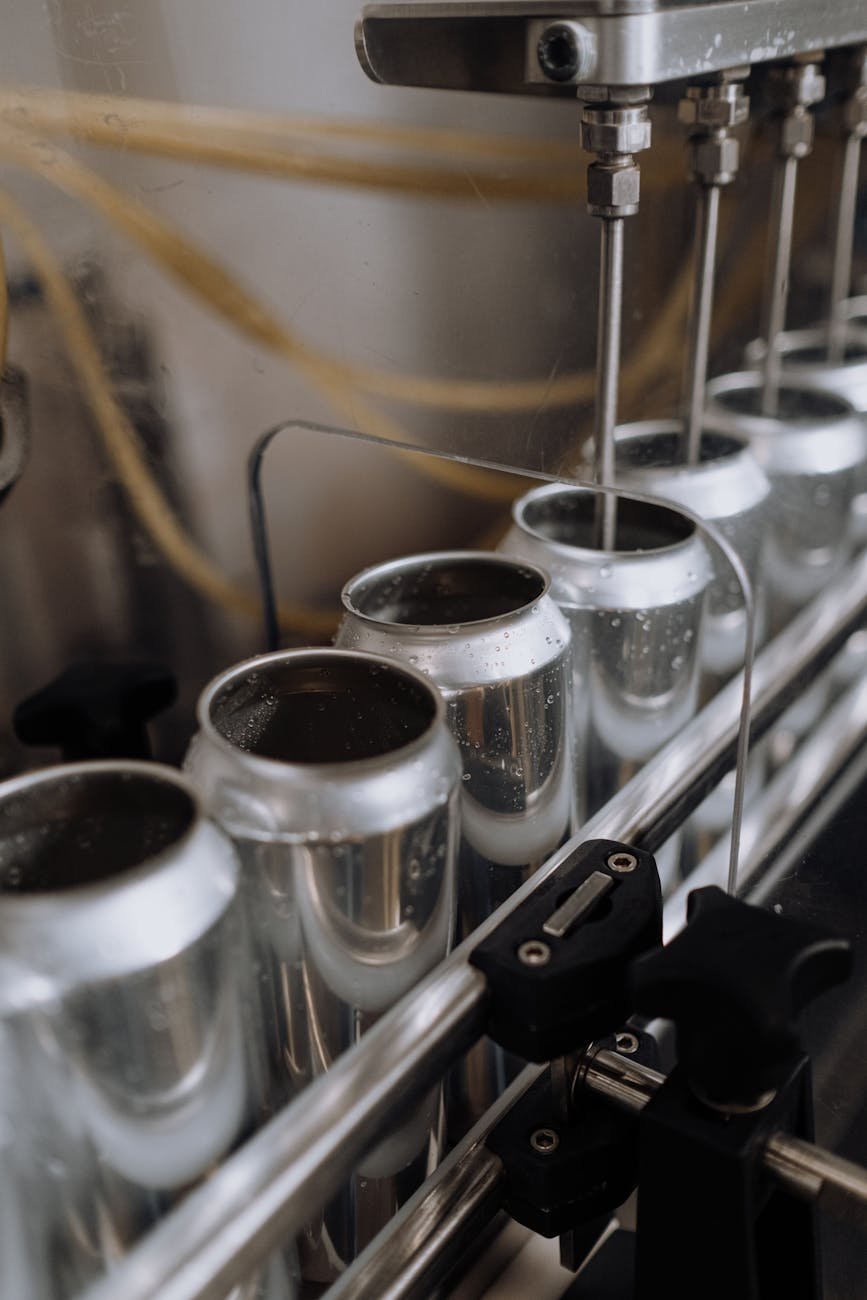Importance of Marketing Automation in Manufacturing
Marketing automation plays a crucial role in transforming how manufacturing companies manage and execute their marketing strategies. By leveraging advanced technologies, manufacturing businesses can enhance their lead conversions and boost deal sizes effectively.
Boosting Lead Conversions
Manufacturers that implement marketing automation see significant improvements in lead conversions. According to a report by Aberdeen, companies utilizing marketing automation observe a 107% increase in lead conversions (SugarCRM). This substantial improvement can be attributed to the automated processes that target potential clients with personalized and timely marketing efforts.
By automating repetitive tasks such as email marketing, social media posting, and campaign management, manufacturers can ensure that their prospects receive relevant and consistent communications. These tailored interactions increase the likelihood of converting leads into customers. For more insights on boosting lead conversions, check out our guide on manufacturing lead generation strategies.
Enhancing Deal Sizes
Marketing automation not only enhances lead conversions but also significantly increases the average deal size. Firms using automation technology report a 40% greater average deal size (SugarCRM). This is achieved by nurturing leads through the buyer’s journey with targeted content and offers that align with their specific needs and pain points.
Automated marketing campaigns can track and analyze customer interactions to identify high-value leads. This data-driven approach enables sales teams to focus on prospects with the highest potential, optimizing their efforts and resources. Additionally, automation tools provide detailed insights that help in crafting personalized proposals and pricing strategies, further contributing to the increase in deal sizes.
| Metric | Improvement with Marketing Automation |
|---|---|
| Lead Conversions | 107% |
| Average Deal Size | 40% |
| Attainment Quota | 20% |
| Forecast Accuracy | 17% |
| Customer Retention | 15% |
For more strategies on enhancing deal sizes, explore our tips on b2b manufacturing marketing tactics.
Incorporating marketing automation into the overall marketing strategy can yield significant benefits for manufacturing businesses, including improved lead conversions and larger deal sizes. For a comprehensive overview of effective strategies, visit our article on manufacturing marketing strategies.
Integrating Marketing Automation with CRM
Implementing marketing automation in the manufacturing sector involves seamlessly integrating these automation tools with Customer Relationship Management (CRM) systems. This integration is pivotal for leveraging advanced functionalities that significantly enhance client engagement and lead management.
Personalized Marketing Campaigns
Combining marketing automation with CRM allows businesses to craft highly personalized marketing campaigns tailored to individual customer profiles. This strategic synergy empowers companies to gather, analyze, and utilize detailed customer data efficiently. As noted by SugarCRM, CRM integration eliminates manual processes and aligns marketing efforts with sales around a streamlined process.
| Benefits of CRM and Automation Integration | Impact on Manufacturing Marketing |
|---|---|
| Detailed Customer Insights | Facilitates tailored marketing efforts |
| Eliminates Manual Processes | Boosts efficiency and reduces errors |
| Alignment of Sales and Marketing | Creates cohesive and targeted campaigns |
Personalization through automation tools has been shown to significantly increase conversion rates and customer retention in manufacturing sales (Right Information). By utilizing customer data to provide individualized product experiences, manufacturing businesses can make clients feel understood and valued, which enhances trust and loyalty. Discover more ways to enhance your marketing efforts with manufacturing content marketing.
Streamlining Lead Management
Streamlining lead management is another crucial benefit of integrating marketing automation with CRM systems. This integration facilitates a seamless process for tracking, nurturing, and converting leads. Automation enables instant responses to customer queries and empowers customers with self-service options, thereby improving the speed and efficiency of customer interactions (Right Information).
Key aspects of streamlined lead management include:
- Automated Lead Scoring: Prioritizes high-potential leads based on predefined criteria.
- Lead Nurturing Campaigns: Sends targeted content to guide leads through the sales funnel.
- Data Synchronization: Ensures that all customer information is up-to-date across all platforms.
Manufacturers can significantly enhance their lead management processes by adopting these automated solutions, reducing the time and effort required to convert leads into customers. For more strategies on effectively managing and nurturing leads, explore our article on manufacturing lead generation strategies.
Integrating marketing automation with CRM systems brings forth numerous advantages for manufacturing businesses. It creates opportunities for personalized marketing campaigns, enhances lead management processes, and aligns sales and marketing efforts towards common goals. Embrace these tools to elevate your manufacturing marketing strategies, and stay ahead in the competitive industrial landscape. For more insights, explore our resources on digital marketing for manufacturers and industrial marketing for manufacturers.
Leveraging Lead Scoring in Manufacturing
Implementing lead scoring within manufacturing marketing automation is essential for optimizing sales efforts and improving overall productivity. By assigning scores to leads based on various factors, manufacturers can better focus their sales strategies.
Focusing Sales Efforts
Lead scoring helps manufacturers ensure that sales teams are concentrating their time and resources on the most promising leads. Marketing automation platforms assign scores based on criteria such as demographic information, behavior, and engagement level (SugarCRM). This scoring process filters out less qualified leads, enabling the sales team to prioritize high-value prospects.
| Criteria | Lead Score |
|---|---|
| Demographics | 30% |
| Engagement | 40% |
| Behavior | 30% |
Focusing sales on the highest potential leads is particularly beneficial for manufacturing firms with large sales forces or channel partners. This approach maximizes efficiency and ensures that sales efforts are directed towards areas with the greatest likelihood of conversion. For those looking to explore more techniques, check our guide on manufacturing marketing strategies.
Optimizing Sales Forces
Optimizing the efforts of a sales team is crucial for increasing deal sizes and overall success rates. Lead scoring plays a significant role in this optimization process by enabling the salesforce to concentrate on the most lucrative opportunities. This targeted approach helps to eliminate wasted effort on low-potential leads, ensuring that the team’s energy is used where it will have the most impact.
Effective lead scoring can also provide insights into the performance of different sales team members, highlighting strengths and areas for improvement. By using detailed analytics and automated workflows, sales managers can adjust strategies to align with the needs of the most qualified leads. For further insights into enhancing marketing strategies, visit our resources on digital marketing for manufacturers and industrial marketing for manufacturers.
By leveraging lead scoring, manufacturing firms can refine their sales approaches and achieve a higher level of success in their marketing campaigns, making better use of their resources and optimizing their impact in the market.
Utilizing Detailed Reports for Performance Insights
In the realm of manufacturing marketing automation, detailed reports are crucial for gaining actionable insights into various performance metrics. These reports help manufacturing plant owners, operations managers, and marketing executives to fine-tune their strategies and make data-driven decisions.
Campaign ROI Analysis
Understanding the return on investment (ROI) for marketing campaigns is key for any manufacturing business aiming to optimize its marketing efforts. By leveraging marketing automation platforms, manufacturers can generate detailed reports on campaign ROI, conversion rates, and other essential metrics (SugarCRM).
| Campaign Type | Investment (USD) | ROI (%) |
|---|---|---|
| Email Marketing | 5,000 | 150 |
| PPC Advertising | 10,000 | 200 |
| Social Media Marketing | 7,500 | 180 |
This table represents a simplified overview, illustrating how varying investments in different types of campaigns can yield different ROI figures. Analyzing these metrics helps manufacturers identify which campaigns are most effective and where resources should be allocated.
Email Engagement Metrics
Email marketing remains a powerful tool for manufacturers, particularly in the B2B space. Detailed reports on email engagement metrics such as open rates, click-through rates, and bounce rates allow manufacturers to gauge the effectiveness of their email campaigns and make necessary adjustments (SugarCRM).
| Metric | Benchmark (%) |
|---|---|
| Open Rate | 25 |
| Click-Through Rate | 10 |
| Bounce Rate | 2 |
Monitoring these metrics provides valuable insights into how well email content resonates with the target audience. High open and click-through rates indicate effective messaging and relevant content, while a low bounce rate demonstrates good email list hygiene.
For further tips on enhancing email marketing performance, our guide on manufacturing content marketing offers additional insights.
By utilizing detailed reports for campaign ROI analysis and email engagement metrics, manufacturers can continually refine their marketing strategies to drive better results and maintain a competitive edge in the market. For more advanced strategies, refer to our article on digital marketing for manufacturers.
Challenges in the Manufacturing Industry
The manufacturing industry faces numerous challenges that can impact the effectiveness of marketing automation strategies. Two of the primary obstacles are labor shortages and supply chain disruptions.
Labor Shortages
Labor shortages are a significant challenge in the manufacturing sector. A considerable portion of the workforce in countries like the USA is expected to face retirement by the end of 2025. This impending shortage could pose substantial hurdles by 2024 (Infosys BPM). The scarcity of skilled labor forces manufacturing companies to invest in training programs and adopt automation to maintain productivity.
| Year | Expected Retirement Workforce (%) |
|---|---|
| 2023 | 35% |
| 2024 | 50% |
| 2025 | 60% |
The implication of labor shortages also affects marketing operations. With fewer hands on deck, marketing teams may need to rely more heavily on automated systems to manage campaigns, nurture leads, and close deals. Companies can address these issues by implementing effective manufacturing marketing strategies that include robust automation tools.
Supply Chain Disruptions
Supply chain disruptions are another critical issue affecting the manufacturing industry. Factors such as inflation, economic instability, and geopolitical disturbances create substantial barriers to conducting business. Moreover, manual inventory checks are often ineffective, leading to shortages, excesses, and unidentified losses.
| Issue | Impact |
|---|---|
| Inflation | Increased costs |
| Economic Instability | Unpredictable demand |
| Geopolitical Disturbances | Delayed shipments |
These disruptions not only affect the production line but also hinder marketing efforts. Effective marketing automation can mitigate some of these problems by optimizing stock levels, predicting demand, and streamlining communication with suppliers. For more insights, refer to our article on digital marketing for manufacturers.
Understanding and addressing these challenges is essential for manufacturing companies aiming to dominate the market through marketing automation. By focusing on solutions for labor shortages and supply chain disruptions, manufacturers can create a more resilient and efficient marketing strategy. For further reading on B2B tactics, visit our page on b2b manufacturing marketing tactics.
Benefits of Automation in Manufacturing
Automation has become a game-changer for the manufacturing industry, offering several benefits that enhance both operational efficiency and the impact of emerging technologies.
Operational Efficiency
Manufacturing automation significantly boosts operational efficiency through various means. By using robots, automated systems, and advanced technologies, manufacturers can achieve higher levels of precision and speed, which directly contributes to improved productivity and reduced operational costs.
Automation minimizes the risk of human error, making production processes more reliable and consistent (Right Information). Tasks that previously required manual labor, such as stacking, labeling, and assembly, are now efficiently performed by automated systems. This transformation allows human workers to focus on more complex and value-added tasks.
Additionally, companies investing in automation notice a significant reduction in direct labor costs, averaging 8% to 12% of production costs. This reduction helps in reallocating resources to other critical areas of the business.
| Key Metrics | Impact of Automation |
|---|---|
| Direct Labor Costs | Reduced to 8%-12% |
| Precision and Speed | Increased |
| Human Error | Minimized |
| Production Consistency | Improved |
For further insights into improving efficiency, visit our piece on manufacturing marketing strategies.
Impact of Technologies
Investing in manufacturing automation involves adopting cutting-edge technologies such as cloud computing, the Internet of Things (IoT), and artificial intelligence (AI). These advancements play a crucial role in optimizing production processes and enhancing overall operational performance (Infosys BPM).
Cloud technology enables seamless data storage and real-time access, facilitating better decision-making and streamlined operations. IoT devices allow for enhanced connectivity between machines, leading to smarter and more efficient factory management. AI, on the other hand, brings automation to a higher level by enabling predictive maintenance, quality control, and process optimization.
For instance, robotics are widely used for repetitive manual tasks such as stacking, assembly, and labeling. These robots not only increase production accuracy but also lower production costs. Implementing these technologies helps manufacturing plants achieve a high level of sophistication and capability, allowing them to stay competitive in the market.
| Technology | Impact |
|---|---|
| Cloud Computing | Real-time access, better decisions |
| IoT | Enhanced connectivity, smarter management |
| AI | Predictive maintenance, quality control |
| Robotics | Increased accuracy, cost reduction |
For more in-depth analysis on technological impact, read our article on digital marketing for manufacturers.
Automation in manufacturing continues to evolve, promising more efficient production processes and paving the way for new advancements. Leveraging modern technologies ensures that manufacturing businesses not only enhance their current operations but also stay ahead in an increasingly competitive industry. For additional strategies and tools, check out our guide on b2b manufacturing marketing tactics.
Top Strategies for Marketing Automation
To truly excel in the competitive manufacturing industry, implementing effective marketing automation strategies is vital. Here, we explore three top strategies crucial for manufacturing marketing automation.
Defining Clear Goals
The foundation of any successful marketing automation strategy begins with setting clear, achievable goals. Defining these goals helps manufacturers to align their automation efforts with their overall business objectives. Objectives may include increasing lead conversions, improving customer retention, or boosting overall sales performance.
To identify these goals:
- Outline specific, measurable targets.
- Define key performance indicators (KPIs).
- Ensure all team members understand and are aligned with these goals.
Here’s a table showing sample goals and their respective KPIs:
| Goal | KPI |
|---|---|
| Increase lead conversions | Conversion Rate (%) |
| Improve customer retention | Customer Retention Rate (%) |
| Boost overall sales | Total Revenue ($) |
Buyer’s Journey Mapping
Mapping the buyer’s journey is essential for understanding the different stages a prospect goes through before making a purchase. This allows manufacturers to create targeted, personalized content that addresses the specific needs and pain points of potential customers at each stage.
The typical stages in the buyer’s journey are:
- Awareness: Recognizing a need or problem.
- Consideration: Evaluating solutions.
- Decision: Choosing a specific product or service.
By mapping the buyer’s journey, manufacturers can:
- Identify touchpoints where automation can be most effective.
- Develop personalized content for each stage.
- Ensure seamless transitions between stages.
For detailed strategies on how to map the buyer’s journey, visit our page on manufacturing content marketing.
Automated Workflows
Automated workflows streamline marketing processes by automating repetitive tasks, enabling marketing teams to focus on more strategic activities. In the manufacturing sector, effective workflows include email marketing campaigns, lead nurturing sequences, and customer follow-ups.
Implementing automated workflows involves:
- Identifying tasks that can be automated.
- Setting up triggers based on customer actions.
- Regularly monitoring and optimizing workflows for improved performance.
| Workflow Type | Purpose | Trigger |
|---|---|---|
| Email Campaign | Engage with prospects | Form submission |
| Lead Nurturing | Guide through sales funnel | Website visit |
| Customer Follow-up | Strengthen relationships | Purchase completion |
For best practices on setting up automated workflows, explore our article on digital marketing for manufacturers.
Adopting these top strategies can significantly improve a manufacturer’s marketing automation efforts, leading to better customer engagement and increased sales conversion rates. By setting clear goals, effectively mapping the buyer’s journey, and implementing automated workflows, manufacturers can enhance their overall marketing performance and dominate the market.
Future Trends in Manufacturing Marketing
Automation Adoption
The adoption of automation in manufacturing marketing continues to grow, driven by the industry’s need to enhance efficiency and accuracy. Implementing marketing automation technologies helps firms improve lead conversions by 107% and achieve a 40% greater average deal size. The following table showcases the impact of automation on key performance metrics:
| Performance Metric | Improvement with Automation |
|---|---|
| Lead Conversions | 107% |
| Average Deal Size | 40% |
| Attainment Quota | 20% |
| Forecast Accuracy | 17% |
Automation in manufacturing marketing not only supports lead generation and conversion but also ensures that marketing campaigns are more personalized and targeted. Marketing automation platforms enable manufacturing businesses to tailor their messages based on customer data and behavior, enhancing the relevance of their communications. For more details, visit our page on manufacturing marketing strategies.
By automating repetitive tasks, sales productivity is significantly boosted. The sales team can manage more leads effectively and close deals faster (Right Information). Companies that embrace automation can stay competitive and adaptive in the rapidly evolving market. For best practices on using automation in your marketing strategies, check out our article on digital marketing for manufacturers.
Anticipated Industry Changes
The manufacturing industry is poised for several transformative changes that will influence marketing strategies. According to a report, global manufacturing output experienced a 3.9% growth rate as of September 2022. However, challenges such as inflation, economic instability, and geopolitical disturbances are making it increasingly difficult to conduct business.
Several anticipated trends include:
Increased Automation and AI Integration: The integration of artificial intelligence with marketing automation tools will further refine campaign targeting and personalization. AI-driven insights can optimize customer segmentation and improve engagement strategies.
Data-Driven Decision Making: Manufacturers will increasingly rely on detailed analytics and reporting to measure the ROI of their marketing campaigns. Utilizing detailed reports, such as campaign ROI analysis and email engagement metrics, will provide actionable insights into marketing performance. Refer to our section on utilizing detailed reports for performance insights for more information.
Predictive Analytics: Leveraging predictive analytics will enable manufacturing firms to anticipate market trends and customer needs, allowing for proactive marketing efforts. This technology will help refine lead scoring systems and prioritize high-potential prospects.
Enhanced Customer Experience: Enhancing the customer journey with seamless interactions across multiple touchpoints is becoming more critical. Mapping the buyer’s journey and understanding customer pain points can lead to more effective marketing and higher customer satisfaction.
The manufacturing industry must stay ahead of these trends to maintain a competitive edge in the market. By embracing these anticipated changes and leveraging the power of automation, manufacturers can optimize their marketing efforts and achieve greater success.
For an in-depth look at combining SEO with manufacturing marketing, visit our article on seo for manufacturing industry. Additionally, for insights into other B2B marketing tactics, see our page on b2b manufacturing marketing tactics.





















